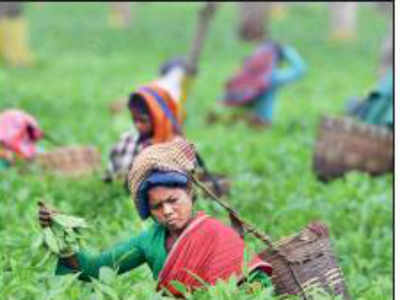- News
- India News
- Little-known tea gardens stir Kishanganj poll pot
Trending
This story is from April 16, 2019
Little-known tea gardens stir Kishanganj poll pot

Locals in Bihar’s Kishanganj are upset with the government for ignoring the tea potential of the region. (AFP)
PATNA: Think tea and the names that automatically come to your head are Darjeeling, Assam and possibly the Nilgiris. But there’s a nearly invisible dot on the country’s tea map — Kishanganj in Bihar.
This district bordering Bengal, less than 200km from Darjeeling, produces around 20,000 tonnes of its own variety of the brew annually and gives employment to more than 1,000 people.
The locals, however, are upset with the government for ignoring the tea potential of Kishanganj, which goes to polls in the second phase. The state’s alleged neglect of the nascent tea industry here will weigh on the minds of a large section of voters when they press the EVM button on April 18. “When we think of tea plantation, hilly terrains come to mind. But tea does not necessarily mean Darjeeling hills. That’s the impact of Bollywood. The weather is comparatively cooler in Kishanganj as it is close to Darjeeling and rain water also drains out properly here. The climate is similar to tea-producing places like Darjeeling and Siliguri,” says Manish Daftari, whose family owns one of the biggest tea estates and a processing unit in Kishanganj.
The two tea-growing blocks of Kishanganj —Pothia and Thakurganj —are doing well, thanks to favourable soil quality and natural drainage system in the area. The Tea Board of India has also declared the neighbouring Purnia, Katihar and Araria as suitable locations for tea plantation. These three Lok Sabha constituencies in the Seemanchal region will also go to the polls on April 18.
Though there are just nine tea processing units in Kishanganj, the production is much higher, enabling producers to sell their produce in the neighbouring West Bengal as well.
“The major chunk of profit is enjoyed by the middlemen who sell packaged tea. These people earn a profit of around Rs 25 by selling 1kg of tea against Rs10 per kg profit earned by the tea producers,” says Tanweer Alam, who owns a tea plantation in the Belua panchayat.
Local activist Manzar Alam holds the government responsible for the plight of the tea growers in the region. “The whole business runs through neighbouring West Bengal as the response of our government is lukewarm,” he says.
This district bordering Bengal, less than 200km from Darjeeling, produces around 20,000 tonnes of its own variety of the brew annually and gives employment to more than 1,000 people.
The locals, however, are upset with the government for ignoring the tea potential of Kishanganj, which goes to polls in the second phase. The state’s alleged neglect of the nascent tea industry here will weigh on the minds of a large section of voters when they press the EVM button on April 18. “When we think of tea plantation, hilly terrains come to mind. But tea does not necessarily mean Darjeeling hills. That’s the impact of Bollywood. The weather is comparatively cooler in Kishanganj as it is close to Darjeeling and rain water also drains out properly here. The climate is similar to tea-producing places like Darjeeling and Siliguri,” says Manish Daftari, whose family owns one of the biggest tea estates and a processing unit in Kishanganj.
The two tea-growing blocks of Kishanganj —Pothia and Thakurganj —are doing well, thanks to favourable soil quality and natural drainage system in the area. The Tea Board of India has also declared the neighbouring Purnia, Katihar and Araria as suitable locations for tea plantation. These three Lok Sabha constituencies in the Seemanchal region will also go to the polls on April 18.
“The tea plantation in Kishanganj is now spread over an area of 50,000 acres of land, giving livelihood to more than 1,000 people,” he says.
Though there are just nine tea processing units in Kishanganj, the production is much higher, enabling producers to sell their produce in the neighbouring West Bengal as well.
“The major chunk of profit is enjoyed by the middlemen who sell packaged tea. These people earn a profit of around Rs 25 by selling 1kg of tea against Rs10 per kg profit earned by the tea producers,” says Tanweer Alam, who owns a tea plantation in the Belua panchayat.
Local activist Manzar Alam holds the government responsible for the plight of the tea growers in the region. “The whole business runs through neighbouring West Bengal as the response of our government is lukewarm,” he says.
End of Article
FOLLOW US ON SOCIAL MEDIA










